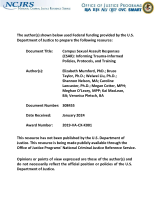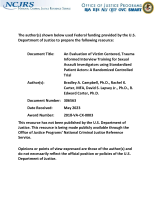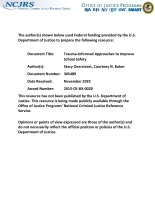Trauma
Campus Sexual Assault Responses (CSAR): Informing Trauma-Informed Policies, Protocols, and Training
Distance to Trauma Centers Among Gunshot Wound Victims: Identifying Trauma 'Deserts' and 'Oases' in Detroit
Trauma Appraisals and Posttraumatic Growth Among Survivors of Sexual Assault
Childhood Physical Abuse (CPA), Childhood Sexual Abuse (CSA), Abusive Traumatic Brain Injury (TBI), Childhood Emotional Abuse (CEA), Neglect, and Other Trauma
Collective trauma: Childhood abuse, perceived discrimination, and COVID-19
Suppression and Memory for Childhood Traumatic Events: Trauma Symptoms and Non-Disclosure
Youth Dually-Involved in the child welfare and juvenile justice systems: Varying definitions and their associations with trauma exposure, posttraumatic stress, & offending
Creating a Digital Trauma Informed Space: Chat and Text Advocacy for Survivors of Violence
Quantitative Assessment of Fracture Characteristics in Blunt Force Skeletal Trauma for Forensic Interpretations
Mechanics of Retinal Hemmorhage in Abusive Head Trauma
Inclusive Research: Engaging People Closest to the Issue Makes for Better Science & Greater Impact; 2023 NIJ Research Conference Plenary
This panel will discuss what inclusive research is, how to conduct it, and what issues and challenges exist about engaging in it. “Inclusive research” has its history as a participatory research method designed to ensure people closest to the issue or problem under study are authentically engaged in the research process rather than simply being “research subjects.” While community-based participatory research has begun to take on greater prominence in the criminal justice realm, such efforts are largely confined to qualitative research inquiries.
See the YouTube Terms of Service and Google Privacy Policy
Meeting People Where They Are to Improve Institutional Culture
Incarcerated individuals deserve opportunities for healing and growth, but they often lack the necessary resources for such opportunities. Additionally, organizational cultures that don’t support these outcomes often stand in the way. Researchers and practitioners gathered at NIJ’s 2023 National Research Conference to share ideas and projects that will increase opportunities for incarcerated populations around the country. This show continues their conversation.
A Trauma- and Justice, Equity, Diversity, and Inclusion (JEDI)-Informed Approach to Suicide Prevention in School: Black Boys' Lives Matter
Blunt Force Trauma in the Human Mandible: An Experimental Investigation
Femur Morphology in Healthy Infants and Young Children
An Introductory Examination on the Differences Between Frequentist and Bayesian Multiple Regression Using Real-World Data on Bias-Based Victimization Among Latinx Adults
An Evaluation of Victim Centered, Trauma Informed Interview Training for Sexual Assault Investigators using Standardized Patient Actors: A Randomized Controlled Trial
Blunt force trauma to the ribs: Creating predictive models
Stress, Trauma, and Burnout in Forensic Scientists
Campus Sexual Assault Responses (CSAR): Informing Trauma-Informed Policies, Protocols, and Training
Sexual violence is a significant criminal justice problem with long-term effects for its victims. In particular, sexual assault on or related to college campuses across the United States presents a growing public health and economic burden, starting with significant impacts on academic outcomes.
See the YouTube Terms of Service and Google Privacy Policy






